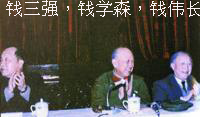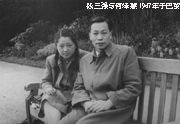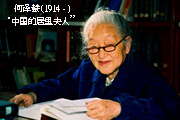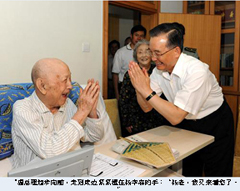Overview
I began writing this series of articles to celebrate the thirtieth anniversary of the Reform and Opening Movement, for which I participated from the outside. China was a different country thirty years ago. The people were divided despite of efforts to make them all the same. There were the faithful followers. They believed in an ideology given by the Communist Party that their present condition was better than the past, and the future would be even better than the present. There were the reluctant followers. They were not happy with their present condition. But they were used to submit to orders, however unwilling. Beyond these two mass groups, there was a small number of people who knew that things were not right, and change was imminent, a rule of history. I have encountered all these people in the process of change, as I had described in other parts of this series how changes in people had shaped China in the last decades. I will now outline the historic conditions that had influenced how China and its people had been meeting with the world. An understanding of how things were will help us predict how a changing China will meet the world in the future.
China is a big country, with a long history marked by a profound culture. It is a culture embracing the thoughts and beliefs of Confucianism, Daoism, and Chan Buddhism (Zen), reflecting “the Chinese way of life”, a way that is readily seen and felt, but not easily understood, sometimes even by us Chinese. Nevertheless, it is a strong and influential culture for anyone who grows up in it, and for people who interface with it through encounters. I have lived with it for seventy five years. I marvel its immense diversity and depth, as I experience it as an earthly Chinese and a transforming world citizen.
Culture and Cultures
There are no clashes of cultures, as some scholars had projected. China has always accepted other cultures and benefited from them. The beginning of such benevolent encounters had occurred as early as 200 BC when trade and exchanges with Indians and Romans flourished. Then, when Buddhist wisdom and beliefs were introduced into China during the Jin Dynasty, 260 AD, they were integrated with the indigenous thoughts and habits to become Chan Buddhism, an important feature of the Chinese way of life, until today.
I was often asked if I had a problem of cultural shock when I first arrived at Ottawa to do graduate studies. I felt grateful knowing the enquirers were intending to be helpful. But when they insisted that there ought to be some shock when I had told them I did not feel so, I felt an offence. Must there be shock in living with people of different habits, customs and beliefs? Only those who lead a limited way of life would believe so. At a later stage when I lived the life of an academic, I also often encountered remarks from fellow professors such as: “you do not look Chinese” or “you do not act like a Chinese”. On such occasions I could only conceal my scorn, and responded with a shrug of my shoulders. They were not even aware of their own prejudice.
Prejudice is recently seen in Oslo when a man who is supposed to be knowledgeable and broadminded announced that he was officiating something of Universal Value. His message to the world was that whoever who dispute that value was outside the universe, and therefore did not have (good) values. One may ask who has the longest history, and which countries have the most people in the universe.
The fact is that the West has had this habit to believe that it not only makes rules for the world, but also has the right to interpret those rules everywhere in the world, and under any condition. Things have changed, and the old habit has to change too.
As I write, I heard in the morning news that a group of high school students from Shanghai had won first prize in a recent international mathematics competition. The same news also reported that a Harvard professor wrote an article to warn that China had now a better education system, and the US would lose if it did not beef up its education. Assuming there is this article, I fail to see the connection between losing a competition and having an inferior education establishment. It is also hard put to link the loss in a mathematics competition to losing a country. I should point out that this professor’s action reflects the habitual belief that US teenagers must win, even in a free competition.
This incident reminds me that it was also a professor of Harvard, one of the most authoritative universities of the United States, who had sounded the warning of “the clashes of cultures” scores of years ago. I wonder if and when there could be a new habit of looking at the world, that there are different cultures, and all of them have the right to stay different and be accepted. We now live in a One- World reality. We must also note that much of the conditions of this reality had been created by the West. There is no point to dispute history. But, there are different viewpoints of how this world could and should move forward, in free competition, and preferably in harmonious cooperation and sharing.
The Unjust Past, Lingering Effects
China had experienced a history of three centuries of unjust competition when she was “opened” by Western powers, with opium, gun-fire, followed by a series of “unequal treaties” and “concessions”. Her meetings with the world were not on her own terms, nor on mutually respected terms. Even when Mao Tsedong announced at Tien On Men Square on October 1, 1949 that “We Chinese people have stood up”, China was submitting herself in Communism, a foreign ideology.
Clashes of cultures (ways of thought, habit, relations, values, aspirations) were predictable as China went through change after change until she decided, once again, to reform and open (accept and meet other nations on equal terms). Now, in the thirty years since that decision, Chinese society and people had made monumental changes, and the cries for Fu Xing 復興 had been mounting in crescendo day by day.
Fu Xing is time-bound and content-bound. It means the revival of a higher or more satisfying state from a degraded or deteriorated state, along a time line. The goal is to create a better future. The driving force is the courage to challenge the status quo and to embrace new alternatives. The Renaissance, for example, was Europe’s expression of its dissatisfaction of the Dark Age, and a revival of the freedom and creativity of former eras in philosophy, the arts, and humanities. For China now, people must amass the courage to rid off any ideology that cripples independent thought and action, and to restore the tradition of harmonious human relations in families and communities.
This is by no means easy. Central in the task is to rid off from the mind the effects of what was called “semi-colonialism”. The material aspect of it is the feeling that while colonial rule was bad, it had left some formidable legacies for admiration. We see today in Shanghai beautiful buildings all over the former foreign concessions 租界. They had not been destroyed even by the Red Guards who had relentlessly destroyed everything traditional. Were these people afraid of foreigners (who were no longer around), and therefore afraid to tear down their residences? No one could tell. What we are sure of is the fact that even the present school system is borrowed from the West. The effect of semi-colonialism runs very deep. It has sunk to the bottom of the Chinese psych, preventing the people to get rid of it. Only when a people who believe in the value of their indigenous culture would make them feel truly independent and free.
Independence is basic human nature. It begins with a person knowing who he is and feeling free to be the master of his own life. This concept of freedom is written in the Chinese belief of “When Nature is in good order, the gentleman (normal person) acts persistently in bettering himself” 天行健, 君子以自強不息. It is a different concept compared to the “God given freedom” or “civil liberty” or “human right’s freedom” of the Western culture. In it, human beings are subsumed in the grand order of the universe, and he is responsible for his own good, happiness, progress and dignity. All other human relationships (civil responsibility included) begin from the independent person striving to take care of himself. Thus, Confucius said, “What you do not wish for yourself, do not do it unto others” 己所不欲 勿施於人. Combined with the corollary wisdom of “As one wishes to establish oneself, also help others to establish themselves: as one wishes to express oneself, also help others to express themselves” 己欲立立人, 己欲達達人, we will have a harmonious world, a practical reflection of the grand ideal of harmony, 和.
The Task of Rebuilding
Looking forward from 2011, it would be relatively easy for China to build a wealthy society. It would take far more effort for her to restore the old values of being independent and harmonious. To do so, China must have the courage to admit that she had made fateful mistakes of having denounced her own traditional culture in repeated social-political movements since 1919. Only so can she knowingly and wholeheartedly enshrine the fundamental wisdom of the Chinese culture, and educate her people that they need not borrow any ideology or values from other countries, but be independent and free on their own. There is no need to fear foreign powers just because we had suffered humiliation in history.
Looking back in the perspective of the past two centuries, China had gone astray under the pressures of opium, gun-fire, the menace of wars, ideological confusion, resulting in an ignorant denial of her own culture. That was, in large measures, the effects of having been subjected to semi-colonial existence. In fact, China had even lost her independence in education. Her modern school system and curriculum are largely borrowed wholesale from other countries. Up till even now, many intelligent people still nest in their minds a mysterious admiration for foreigners and their ways of life. They spend more energy in borrowing foreign innovations than making their own. Therefore, the present task of Fu Xing lies in helping the entire people to regain confidence as a free and independent people, and to know and respect their own formidable cultural legacy.
In today’s perspective, this cultural legacy has two parts. It includes (1) the traditional way of life reflecting the wisdoms of Confucianism, Daoism, and Chan-Buddhism, and (2), insights gained by some 50 million Chinese overseas (Hua Qiao)華僑 from all parts of the world. A review of history reveals that the Chinese people began in northern China thousands of years ago. They called the Yellow River their Mother River. On its banks they developed the ancient culture, marked by the fundamental concepts of peace and harmony. Following the flow of time, the original settlers were gradually driven southwards by invaders of northern tribes, some of which ruled the country for a number of dynasties, such as the Yuen and the Qing. However, the ancient culture was so formidable that even the alien invaders submitted themselves to learn and abide by it. Thus, the concept of harmony united and fused all the peoples as they interacted in war and peace through many millennia, resulting in what is called The Chinese today.
The southward movement led the Chinese to thrive in the Yangtze River delta (YRD) and, centuries later, in the Pearl River delta (PRD). Then, as China began to encounter foreign powers from the West, from the 18th Century on, people in the PRD region began a Diaspora Movement to seek opportunities abroad. They first explored the Southeast Asian countries and, in time, went further to the Americas, Europe, and all corners of the globe. Wherever they went, they absorbed the local skills and ideas and integrated them into their own way of life to form new ideas and experiences. The most distinctive characteristic of Hua Qiao is their love of the motherland. The perennial belief of “fallen leaves return to their roots” 落葉歸根 compels all of them to return to the motherland for retirement. It means that, while struggling oversees, the goal of life is to help build a better and stronger China.
Towards the end of the Qing Dynasty, as China became the “nutritious pie” to be divided and consumed by the foreign powers, her patriotic sons and daughters embarked on a number of different approaches to save their motherland from total defeat. In the process of 100 years, China went through scores of social/political/cultural movements which tested the effectiveness of these different approaches. Beginning with the Tai Ping Revolution these movements proceeded with the end of feudalism, the establishment of the First Republic, the May Fourth Movement, the Anti-Japanese War, the Civil War, the establishment of the People’s Republic, the Korean Conflict, the Great Leap Forward Movement, the Class-struggles Movements, the Proletarian Cultural Revolution, and the Reform and Opening Movement, leading to now, the Fu Xing Movement.
Forces from Abroad
With only three exceptions, the above movements got their vitalities from the Chinese Oversees who brought back to the motherland not only ideas and skills, but also money to support the movements, helping them to proceed and succeed. I know this historic trend from personal experience. One of my uncles who went oversees to Siam sold all he had to help Sun Yetsen with the 1911 Revolution. He became so poor that his two sons were brought up in my father’s family. Then, seven decades later, as China needed a change, I got involved in the Opening and Reform Movement, providing ideas and forging connections to help shape the direction of change. This is not an isolated experience. Even during the aftermath of the Great Leap Forward Movement which left China in a state of famine, ordinary people in Hong Kong kept sending food and utilities to help their relatives and friends to survive for years. I hope the universities will one day study the Hua Qiao movement and their contributions to the motherland, as well as to set up courses to help future generations to study them.
The Diaspora Movement of the Chinese had also left millions of people living in all countries of the world, including descendents of the earlier settlers who are now citizens of these countries. There are very few Hua Qiao now. Nevertheless, the descendents who bear the marks of “The Chinese People” hold an affinity to China and the Chinese culture. Some of them feel proud of their biological heritage. Others feel proud of their cultural heritage. Still others feel proud of everything that is Chinese, ancient and now. The marks I refer to exemplify many forms and psychological links. A colleague of mine at the University of Toronto, Arthur Sim, who is second generation Chinese born of Chinese father and a Black Jamaican mother, is spending all his retirement time promoting the Hakka culture. His wife of similar heritage keeps the family meals in half Hakka dishes and half Jamaican dishes. They are Canadians now. Their sons, Ron and Ray, work in New York and Kingston, Ontario respectively. Ron had married a Chinese girl from Suzhou. He and his wife have a boy recently. From the many pictures of the three-generation family that Arthur sends to me, I can see they are keeping the “flavour” of a traditional Chinese family.
 When such affinity is transformed into intellectual input to the motherland, the process of linkage is more complicated. Each of “The three national treasures” named by Zhou Enlai had returned to China from abroad in his own way. I have described the fate of Qian Wai Chang 錢偉長earlier in this series of articles.
When such affinity is transformed into intellectual input to the motherland, the process of linkage is more complicated. Each of “The three national treasures” named by Zhou Enlai had returned to China from abroad in his own way. I have described the fate of Qian Wai Chang 錢偉長earlier in this series of articles.

 Qian San Qiang 錢三强, Father of China’s Atomic and Hydrogen Bombs, exploded in 1964 and 1967 respectively, had a different fate. He was sent away to study Mao’s Thoughts at a labour camp just four days after his success. He had returned to China from France in 1948, just on time to celebrate the establishment of the People’s Republic, and he led a research team to produce the two bombs, making China a strong country not to be humiliated by the world powers. But, he could not escape the foolishness of the Cultural Revolution, the biggest shame in history.
Qian San Qiang 錢三强, Father of China’s Atomic and Hydrogen Bombs, exploded in 1964 and 1967 respectively, had a different fate. He was sent away to study Mao’s Thoughts at a labour camp just four days after his success. He had returned to China from France in 1948, just on time to celebrate the establishment of the People’s Republic, and he led a research team to produce the two bombs, making China a strong country not to be humiliated by the world powers. But, he could not escape the foolishness of the Cultural Revolution, the biggest shame in history.
 Qian Xue Sen’s 錢學森entrance was most dramatic. Before he was able to leave the United States, he was kept in confinement for years by the US Immigration Department. Then, it took a diplomatic negotiation to obtain his release, with the exchange of eight American prisoners of war for him and his family to return to China in 1955. He came home empty-handed, except his brain. He later became China’s Father of Guided Missiles, and lived up to 98 years old.
Qian Xue Sen’s 錢學森entrance was most dramatic. Before he was able to leave the United States, he was kept in confinement for years by the US Immigration Department. Then, it took a diplomatic negotiation to obtain his release, with the exchange of eight American prisoners of war for him and his family to return to China in 1955. He came home empty-handed, except his brain. He later became China’s Father of Guided Missiles, and lived up to 98 years old.
In his later years, Qian Xue Sen saw the mistakes in Chinese education, which was dogmatic in nature, teaching children information rather than the freedom to think. He made a bold attempt to inform the leaders that the study of the social sciences is just as important as the study of science. During the last decade of his life, he even initiated a number of studies in psychology, including the interactions of Qi Gong 氣功with the working of the mind. Unfortunately, it seemed that the leaders had not understood him enough to make a change in education.
 According to reports, Premier Wan Jia Bao 溫家寶 had visited Qian in hospital a number of times during his last years. He had asked Wan why China had not produced a scientist or scholar of international fame in 60 long years. He answered his own question and said: “It is because our schools and universities had not been teaching tens of millions of children to be independent, free human beings." He died on 31 October 2009. In his, one of the most elaborate funerals in recent time, all attending leaders praised him for his signal contributions to the motherland. They also called everyone in China to learn from him.
According to reports, Premier Wan Jia Bao 溫家寶 had visited Qian in hospital a number of times during his last years. He had asked Wan why China had not produced a scientist or scholar of international fame in 60 long years. He answered his own question and said: “It is because our schools and universities had not been teaching tens of millions of children to be independent, free human beings." He died on 31 October 2009. In his, one of the most elaborate funerals in recent time, all attending leaders praised him for his signal contributions to the motherland. They also called everyone in China to learn from him.
The Future
Educational change takes a long time in any society, more so in China. I am confident that Qian’s call for change will be heard and heeded one day. When that comes about, China’s sons and daughters will be able to appreciate their own cultural heritage and apply the wisdom imbedded in it freely. They will no longer suffer from the effects of semi-colonialism, and believe in the supremacy of foreign ideologies and skills that they should borrow and depend on them. They will innovate boldly and lead lives Chinese style. They will apply the principles of harmony and universal brotherhood in their meetings with the world.
No one knows the future, not tomorrow, the next year, or the next century. But human beings are still time-bound. We are able to look back to the past in order to understand the present and what is to come. I have unveiled the various living dimensions of China and the Chinese in recent history to describe how and why history had proceeded the way it did. If I am allowed to end this series with an optimistic note, I would say that of all the individuals that I had depicted in my writing, there are thousands and thousands like them to come. They will meet the world on their own independent terms, courteously, caringly, and harmoniously, in accordance with THE CHINESE WAY.

